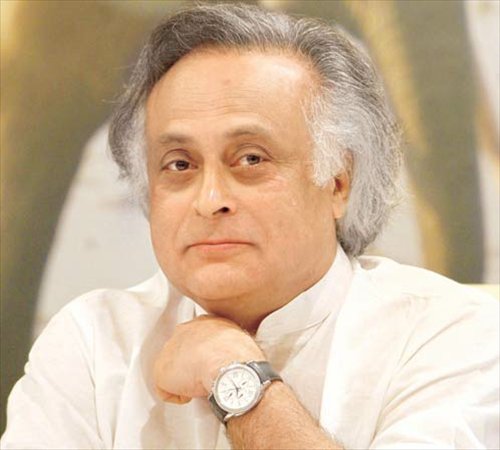Dragon-elephant rivalry should be rejected

Jairam Ramesh
Editor's Note:
Narendra Modi's first state visit to China as Indian prime minister has raised questions about where both countries are heading. Will China and India be more competitors than partners? What role should China and India play in new international institutions such as the Asian Infrastructure Investment Bank (AIIB)? Global Times (GT) reporter Liu Zhun talked to Jairam Ramesh (Ramesh), former Indian minister of rural development and now member of parliament, about these issues. Ramesh is an economist and politician who coined the term "Chindia."
GT: What progress in bilateral relations do you expect Modi's visit could make?
Ramesh: Modi's visit is hugely significant. I certainly don't expect miracles particularly on the border issue or on the issue of water resources which is a source of great worry in India, but on investment and trade certainly some major announcements could be realistically expected.
I hope the visit will boost academic and media interactions between the two countries as well as people-to-people contacts.
GT: Modi's government has laid a great deal of emphasis on India's economic development. Some media speculate that enhancing economic ties is one of the purposes of Modi's visit. But India's trade deficit with China keeps rising, and will probably double in the next two years to $60 billion. What do you think both sides can do to improve their trade structure to earn win-win?
Ramesh: All governments in India have laid emphasis on economic development and GDP growth averaged around 7.5 percent per year between 2004-14.
All governments in India since the historic handshake of then leaders Deng Xiaoping and Rajiv Gandhi in December 1988 have pushed for enhanced economic ties and engagement.
But India has been concerned with the prevalence of non-trade barriers in China which prevent greater exports from India in areas like pharmaceuticals.
The responsibility for making its exports competitive in Chinese markets is primarily India's, but many Indian exporters have for long been complaining of the lack of transparency in Chinese pricing and also of non-tariff barriers.
Chinese investment in India to meet its own home demand is one way of reducing the huge trade deficit.
GT: The Chinese economy has entered a "new normal" situation and witnessed an economic downturn. Last year's statistics showed that India's growth rate slightly surpassed that of China. Many Western media and analysts think India's economy will eventually replace China as the engine of the global economy. What do you think?
Ramesh: India has a long way to go but there is no race between the two countries.
What India can accomplish will, to a large extent, be influenced by its political and social system which is fundamentally different from China's. Comparative evaluation is meaningless, but comparative evolution can certainly be studied. Our growth rate may surpass that of China's, but our per capita income is considerably lower.
As far as China's economic "new normal" is concerned, we should not forget that it comes after a sustained 8-9 percent growth over almost three decades.
It may be called a "soft landing," but definitely cannot be called a recession. It is also appropriate that China is now looking more seriously at the quality of growth, especially from an environmental point of view.
GT: China has come up with a couple of regional initiatives since President Xi Jinping took office, such as the Bangladesh-China-India-Myanmar economic corridor and the 21st Century maritime silk road. India, without any doubt, is an important link in these projects. What impact do you think the "One Belt One Road" project can have to India?
Ramesh: These initiatives announced by Xi are definitely very interesting and need to be studied and analysed in detail. There is one view that these initiatives are anchored in the Chinese desire for hegemony through trade, investment and infrastructure. But as I said, the initiatives must be examined objectively and dispassionately.
Greater sensitivity by China to the fears and concerns expressed by its friends and partners will certainly not be out of place. There is no substitute for free and frank discussion. My Chinese friends must try and understand why others do not always look at issues and matters in the same way China does and in the way China expects others to do.
GT: The Western world keeps talking about India-China relations as "a rivalry between the dragon and the elephant," especially when it comes to border issues. What do you think of such judgment? Will China and India be more competitors than partners?
Ramesh: I reject this idea that China and India are natural rivals. Yes, there is competition in many areas, but that is not to be afraid of. Competition does not mean confrontation or conflict.
The world is big enough, as former Indian prime minister Manmohan Singh used to say, to accommodate the growth aspirations of both China and India, but both countries have to be far more sensitive to the ecological dimensions of growth.
We cannot pollute, contaminate or deforest our way to prosperity. Both countries will compete but can also collaborate and cooperate with each other. We must not look at each other through the eyes of someone else.
GT: What do you think of the AIIB? What cooperation can India and China establish through this new bank, which is different from the Western-controlled Asian Development Bank (ADB) or World Bank? Some people think China and India is competing for a bigger say in the new bank. What do you think?
Ramesh: India and China have collaborated in establishing the BRICS Development Bank and the AIIB is a most useful and timely initiative.
I do not share the US view that it is a Chinese counter to the World Bank or the ADB. The infrastructure needs of a growing and urbanizing Asia are so huge that there is very clearly room for an AIIB-type institution.
But it must be run professionally and democratically and cannot become an instrument of Chinese foreign and strategic policy.